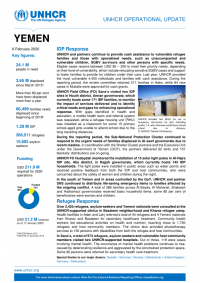Yemen: UNHCR Operational Update, 6 February 2020 [EN/AR]
IDP Response
UNHCR and partners continue to provide cash assistance to vulnerable refugee families and those with specialised needs, such as unaccompanied and vulnerable children, SGBV survivors and other persons with specific needs. Eligible cases receive between USD 80 – 200 to meet their priority needs, depending on their level of vulnerability, which include relocating sensitive SGBV cases and support to foster families to provide for children under their care. Last year, UNHCR provided the most vulnerable 4,405 individuals and families with cash assistance. During the reporting period, the review committee retained 311 families in Aden, while 84 new cases in Mukalla were approved for cash grants.
UNHCR Field Office (FO) Sana’a visited two IDP sites in Houth district, Amran governorate, which currently hosts some 171 IDP families, to monitor the impact of services delivered and to identify critical needs and gaps for enhancing operational response. With gaps identified in health and education, a mobile health team and referral system was requested, while a refugee housing unit (RHU) was installed as a classroom for some 15 primary school-aged girls unable to attend school due to the long travelling distances.
During the reporting period, the Sub-National Protection Cluster continued to respond to the urgent needs of families displaced in Al-Jawf governorate due to recent clashes. In coordination with the Shelter Cluster partners and the Executive Unit under the Government of Yemen (GOY), the partners delivered 62 tents and 157 blankets; distributions are on-going.
UNHCR FO Hudaydah monitored the installation of 15 solar light poles in Al-Hajra IDP site, Abs district, in Hajjah governorate, which currently hosts 145 IDP households. The light poles were installed in public areas such as water points and received positive feedback from both the IDP and host communities, who were concerned about the safety of women and children during the night.
In the south of Yemen and in areas controlled by the GoY, UNHCR and partner SHS continued to distribute life-saving emergency items to families affected by the ongoing conflict. A total of 386 families across Al Bayda, Al Maharah, Shabwah and Hadramaut governorates received basic household items; some 80 per cent of beneficiaries were women and children.
Refugee Response
Over 2,420 refugees, asylum-seekers and Yemeni nationals were consulted at the UNHCR-supported clinics in Basateen neighborhood and Kharaz refugee camp. Health facilities in Aden and Lahj referred a total of 44 refugees and 4 Yemeni nationals from Kharaz and Basateen for secondary healthcare treatment. Community health workers led educational activities on health and nutrition, reaching close to 1,750 refugees and host community members. The clinics also provided physiotherapy services to 150 persons with disabilities from both the refugee and host communities.
In Sana’a, a total of 974 refugees, asylum-seekers and vulnerable host community members visited two UNHCR-supported hospitals. Out of those, 119 were cases involving mental health. The occurrence of mental health problems continues to rise, caused by deteriorating resilience and aggravated by the constrained protection space. Some 60 persons were referred for secondary health care treatment.
https://reliefweb.int/report/yemen/yemen-unhcr-operational-update-6-february-2020-enar
https://reliefweb.int/sites/reliefweb.int/files/resources/73846.pdf
https://reliefweb.int/sites/reliefweb.int/files/resources/73889.pdf

